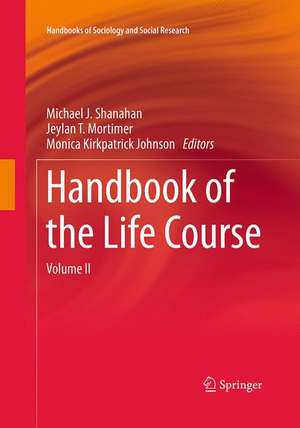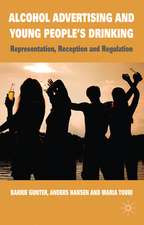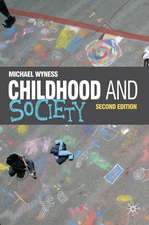Handbook of the Life Course: Volume II: Handbooks of Sociology and Social Research
Editat de Michael J. Shanahan, Jeylan T. Mortimer, Monica Kirkpatrick Johnsonen Limba Engleză Paperback – 4 sep 2017
| Toate formatele și edițiile | Preț | Express |
|---|---|---|
| Paperback (1) | 755.56 lei 43-57 zile | |
| Springer International Publishing – 4 sep 2017 | 755.56 lei 43-57 zile | |
| Hardback (1) | 947.60 lei 38-44 zile | |
| Springer International Publishing – 4 noi 2015 | 947.60 lei 38-44 zile |
Din seria Handbooks of Sociology and Social Research
- 9%
 Preț: 905.56 lei
Preț: 905.56 lei - 18%
 Preț: 2112.71 lei
Preț: 2112.71 lei - 18%
 Preț: 1128.89 lei
Preț: 1128.89 lei - 23%
 Preț: 794.18 lei
Preț: 794.18 lei - 15%
 Preț: 593.26 lei
Preț: 593.26 lei - 18%
 Preț: 809.07 lei
Preț: 809.07 lei - 18%
 Preț: 1407.46 lei
Preț: 1407.46 lei - 15%
 Preț: 670.17 lei
Preț: 670.17 lei - 18%
 Preț: 1233.35 lei
Preț: 1233.35 lei - 18%
 Preț: 1411.39 lei
Preț: 1411.39 lei - 15%
 Preț: 609.79 lei
Preț: 609.79 lei - 18%
 Preț: 1026.76 lei
Preț: 1026.76 lei - 18%
 Preț: 738.20 lei
Preț: 738.20 lei - 18%
 Preț: 966.78 lei
Preț: 966.78 lei - 18%
 Preț: 971.81 lei
Preț: 971.81 lei - 20%
 Preț: 518.43 lei
Preț: 518.43 lei - 18%
 Preț: 1239.99 lei
Preț: 1239.99 lei - 18%
 Preț: 1429.07 lei
Preț: 1429.07 lei - 18%
 Preț: 1136.11 lei
Preț: 1136.11 lei - 15%
 Preț: 665.42 lei
Preț: 665.42 lei - 18%
 Preț: 1234.94 lei
Preț: 1234.94 lei - 18%
 Preț: 983.81 lei
Preț: 983.81 lei - 18%
 Preț: 954.93 lei
Preț: 954.93 lei - 18%
 Preț: 801.34 lei
Preț: 801.34 lei -
 Preț: 413.76 lei
Preț: 413.76 lei - 18%
 Preț: 1405.09 lei
Preț: 1405.09 lei - 18%
 Preț: 1411.25 lei
Preț: 1411.25 lei - 18%
 Preț: 1406.98 lei
Preț: 1406.98 lei -
 Preț: 435.87 lei
Preț: 435.87 lei - 15%
 Preț: 654.77 lei
Preț: 654.77 lei - 15%
 Preț: 714.45 lei
Preț: 714.45 lei
Preț: 755.56 lei
Preț vechi: 921.42 lei
-18% Nou
Puncte Express: 1133
Preț estimativ în valută:
144.57€ • 151.35$ • 119.63£
144.57€ • 151.35$ • 119.63£
Carte tipărită la comandă
Livrare economică 07-21 aprilie
Preluare comenzi: 021 569.72.76
Specificații
ISBN-13: 9783319618159
ISBN-10: 3319618156
Pagini: 720
Ilustrații: X, 720 p. 54 illus.
Dimensiuni: 178 x 254 x 41 mm
Greutate: 1.25 kg
Ediția:1st ed. 2016
Editura: Springer International Publishing
Colecția Springer
Seria Handbooks of Sociology and Social Research
Locul publicării:Cham, Switzerland
ISBN-10: 3319618156
Pagini: 720
Ilustrații: X, 720 p. 54 illus.
Dimensiuni: 178 x 254 x 41 mm
Greutate: 1.25 kg
Ediția:1st ed. 2016
Editura: Springer International Publishing
Colecția Springer
Seria Handbooks of Sociology and Social Research
Locul publicării:Cham, Switzerland
Cuprins
Preface.- Part I. Foundations of Life Course Studies and Future Research.- Chapter 1. The Institutionalization of Life Course Studies; John Bynner.- Chapter 2. Age, Cohorts, and the Life Course; Glen H. Elder and Linda K. George.- Chapter 3. Opening the Social: Sociological Imagination in Life Course Studies; Dale Dannefer, Jessica Kelley-Moore and Wenxuan Huang.- Chapter 4. The Changing Social Construction of Age and the Life Course: Precarious Identity and Enactment of “Early” and “Encore” Stages of Adulthood; Jeylan T. Mortimer and Phyllis Moen.- Chapter 5. Changing Demographic and Legal-Regulatory Contexts: Neglected Sources of Life Course Structures; Gunhild O. Hagestad, and Pearl A. Dykstra.- Part II. Changing Social Contexts and Life Course Patterns.- Chapter 6. Family Heterogeneity over the Life Course; Sandra Hofferth and Francis Goldscheider.- Chapter 7. Educational Pathways; Robert Crosnoe and Aprile Benner.- Chapter 8.
College for All: New Institutional Conflicts in the Transition to Adulthood; Claudia Zapata-Gietl, James E. Rosenbaum, Caitlin Ahearn and Kelly Iwanaga Becker.- Chapter 9. Changes in Educational Inequality in Cross-National Perspective; Pia N. Blossfeld, Gwendolin J. Blossfeld and Hans-Peter Blossfeld.- Chapter 10. Work Over the Gendered Life Course; Phyllis Moen.- Chapter 11. Military Service in the Life Course: Where Do We Go From Here?; Andrew S. London and Janet M. Wilmoth.- Chapter 12. Criminal Justice and the Life Course; Sara Wakefield and Robert Apel.- Chapter 13. Disaster and Life Course Processes; Jack DeWaard.- Part III. Health and Development through the Life Course.- Chapter 14. Early Childhood Poverty: Short and Long-Run Consequences over the Life-Span; Ariel Kalil, Greg J. Duncan and Kathleen M. Ziol-Guest.- Chapter 15. Does the Body Forget? Adult Health, Life Course Dynamics, and Social Change; Mark Hayward and Connor M. Sheehan.- Chapter 16. Education, Health, and Historical Change; Monica Kirkpatrick Johnson, Jeremy Staff, John E. Schulenberg, and Megan E. Patrick.- Chapter 17. Life Course Lens on Aging and Health; Kenneth F. Ferraro.- Chapter 18. Mental Health; William Avison.- Chapter 19. Agency Across the Life Course; Steven Hitlin and Hye Won Kwon.- Chapter 20. Cognitive Development and the Life Course: Growth, Stability, and Decline; Duane Alwin, Jason R. Thomas, and Linda A. Wray.- Part IV. Life Course Research Methodologies.- Chapter 21. Longitudinal Qualitative Research; Joseph Hermanowicz.- Chapter 22. Causality in Life Course Studies; Ravaris Moore and Jennie E. Brand.- Chapter 23. The Logic and Practice of Growth Curve Analysis: Modeling Strategies for Life Course Dynamics; Ross Macmillan and Frank F. Furstenberg.- Chapter 24. Three Generation Studies: Methodological Challenges and Problems; Terrence P. Thornberry.- Chapter 25. Neighborhood, Place, and the Life Course; Christopher R. Browning, Kathleen A. Cagney, and Bethany Boettner.- Part V. The Life Course and Policy: Buildingthe Nexus.- Chapter 26. Life Course Research and the Shaping of Public Policy; John H. Laub.- Chapter 27. Epidemiological Perspectives on the Life Course; Michael EJ Wadsworth and Diana Kuh.- Chapter 28. The Influence of Social Welfare Policies on Health Disparities Across the Life Course; Pamela Herd.- Chapter 29. Life Course Risks and Welfare States’ Risk Management; Martin Diewald.- Chapter 30. Longitudinal Studies and Policy for Children in Low- and Middle-Income Countries: Evidence from Young Lives; Paul Dornan.-Chapter 31. Lags and Leaps: The Dynamics of Demography, Economy, and Policy and Their Implications for Life Course Research; Angela O’Rand and Amie Bostic.
College for All: New Institutional Conflicts in the Transition to Adulthood; Claudia Zapata-Gietl, James E. Rosenbaum, Caitlin Ahearn and Kelly Iwanaga Becker.- Chapter 9. Changes in Educational Inequality in Cross-National Perspective; Pia N. Blossfeld, Gwendolin J. Blossfeld and Hans-Peter Blossfeld.- Chapter 10. Work Over the Gendered Life Course; Phyllis Moen.- Chapter 11. Military Service in the Life Course: Where Do We Go From Here?; Andrew S. London and Janet M. Wilmoth.- Chapter 12. Criminal Justice and the Life Course; Sara Wakefield and Robert Apel.- Chapter 13. Disaster and Life Course Processes; Jack DeWaard.- Part III. Health and Development through the Life Course.- Chapter 14. Early Childhood Poverty: Short and Long-Run Consequences over the Life-Span; Ariel Kalil, Greg J. Duncan and Kathleen M. Ziol-Guest.- Chapter 15. Does the Body Forget? Adult Health, Life Course Dynamics, and Social Change; Mark Hayward and Connor M. Sheehan.- Chapter 16. Education, Health, and Historical Change; Monica Kirkpatrick Johnson, Jeremy Staff, John E. Schulenberg, and Megan E. Patrick.- Chapter 17. Life Course Lens on Aging and Health; Kenneth F. Ferraro.- Chapter 18. Mental Health; William Avison.- Chapter 19. Agency Across the Life Course; Steven Hitlin and Hye Won Kwon.- Chapter 20. Cognitive Development and the Life Course: Growth, Stability, and Decline; Duane Alwin, Jason R. Thomas, and Linda A. Wray.- Part IV. Life Course Research Methodologies.- Chapter 21. Longitudinal Qualitative Research; Joseph Hermanowicz.- Chapter 22. Causality in Life Course Studies; Ravaris Moore and Jennie E. Brand.- Chapter 23. The Logic and Practice of Growth Curve Analysis: Modeling Strategies for Life Course Dynamics; Ross Macmillan and Frank F. Furstenberg.- Chapter 24. Three Generation Studies: Methodological Challenges and Problems; Terrence P. Thornberry.- Chapter 25. Neighborhood, Place, and the Life Course; Christopher R. Browning, Kathleen A. Cagney, and Bethany Boettner.- Part V. The Life Course and Policy: Buildingthe Nexus.- Chapter 26. Life Course Research and the Shaping of Public Policy; John H. Laub.- Chapter 27. Epidemiological Perspectives on the Life Course; Michael EJ Wadsworth and Diana Kuh.- Chapter 28. The Influence of Social Welfare Policies on Health Disparities Across the Life Course; Pamela Herd.- Chapter 29. Life Course Risks and Welfare States’ Risk Management; Martin Diewald.- Chapter 30. Longitudinal Studies and Policy for Children in Low- and Middle-Income Countries: Evidence from Young Lives; Paul Dornan.-Chapter 31. Lags and Leaps: The Dynamics of Demography, Economy, and Policy and Their Implications for Life Course Research; Angela O’Rand and Amie Bostic.
Recenzii
“Handbook of the Life Course: Volume II could usefully sit on any life course researcher’s desk—not on a shelf, because it is too useful. Each chapter offers rich and new insights into the adventure of life courses and life course research. … graduate students and researchers at all levels could beneficially dip into the book again and again for inspiration and guidance.” (Susan McDaniel, Canadian Studies in Population, Vol. 44 (1-2), 2017)
Notă biografică
Michael J. Shanahan is Professor of Sociology and Faculty Fellow at the Carolina Population Center and at the Center for Developmental Science, University of North Carolina at Chapel Hill. He is interested in individual differences in the life course, a theme that he has studied with reference to genetics, health, and personality. Recent articles appear in Social Forces, Developmental Psychology, Journal of Health and Social Behavior, and Social Science and Medicine. His current research examines associations between social circumstances and gene transcription both early and later in the life course.
Jeylan T. Mortimer is Professor of Sociology and Founding Director of the Life Course Center, University of Minnesota, and Principal Investigator of the longitudinal, three generation Youth Development Study. Her interests span the areas of work and socioeconomic attainment, the life course, youth and transition to adulthood. H
er recent articles appear in Social Psychology Quarterly, Social Forces, the Journal of Research on Adolescence, the Journal of Marriage and Family, Developmental Psychology, the Journal of Vocational Behavior, Longitudinal and Life Course Studies, and Demography. Her current research examines intergenerational change and transmission of achievement orientations, the impacts of prior parental experiences and trajectories on their adolescent children, and the sources of resilience in the transition to adulthood. Professor Mortimer is Chair of the Section on Aging and the Life Course in the American Sociological Association. She previously served as Chair of the ASA Sections on Children and Youth, and Social Psychology. Monica Kirkpatrick Johnson is Professor of Sociology and Honors College Distinguished Professor at Washington State University. Her r
esearch interests are in the areas of work, family, and education across the life course, with particular focus on well-being and achievement in adolescence and the transition to adulthood. Her recent research has appeared in the American Journal of Sociology, Longitudinal and Life Course Studies, Social Science Research, Journal of Marriage and Family, Social Forces and Social Psychology Quarterly. Her current research focuses on families’ and young people’s adaptations to the changing nature of the transition to adulthood, including familial financial support in young adulthood and its implications for attainment and well-being; change in educational and work ambitions tied to changing personal and historical circumstances; and the interplay of stratification and the development of social psychological resources in promoting well-being and attainment.
Jeylan T. Mortimer is Professor of Sociology and Founding Director of the Life Course Center, University of Minnesota, and Principal Investigator of the longitudinal, three generation Youth Development Study. Her interests span the areas of work and socioeconomic attainment, the life course, youth and transition to adulthood. H
er recent articles appear in Social Psychology Quarterly, Social Forces, the Journal of Research on Adolescence, the Journal of Marriage and Family, Developmental Psychology, the Journal of Vocational Behavior, Longitudinal and Life Course Studies, and Demography. Her current research examines intergenerational change and transmission of achievement orientations, the impacts of prior parental experiences and trajectories on their adolescent children, and the sources of resilience in the transition to adulthood. Professor Mortimer is Chair of the Section on Aging and the Life Course in the American Sociological Association. She previously served as Chair of the ASA Sections on Children and Youth, and Social Psychology. Monica Kirkpatrick Johnson is Professor of Sociology and Honors College Distinguished Professor at Washington State University. Her r
esearch interests are in the areas of work, family, and education across the life course, with particular focus on well-being and achievement in adolescence and the transition to adulthood. Her recent research has appeared in the American Journal of Sociology, Longitudinal and Life Course Studies, Social Science Research, Journal of Marriage and Family, Social Forces and Social Psychology Quarterly. Her current research focuses on families’ and young people’s adaptations to the changing nature of the transition to adulthood, including familial financial support in young adulthood and its implications for attainment and well-being; change in educational and work ambitions tied to changing personal and historical circumstances; and the interplay of stratification and the development of social psychological resources in promoting well-being and attainment.
Textul de pe ultima copertă
Building on the success of the 2003 Handbook of the Life Course, this second volume identifies future directions for life course research and policy. The introductory essay and the chapters that make up the five sections of this book show consensus on strategic “next steps” in life course studies. These next steps are explored in detail in each section: Section I, on life course theory, provides fresh perspectives on well-established topics, including cohorts, life stages, and legal and regulatory contexts. It challenges life course scholars to move beyond common individualistic paradigms. Section II highlights changes in major institutional and organizational contexts of the life course. It draws on conceptual advances and recent empirical findings to identify promising avenues for research that illuminate the interplay between structure and agency. It examines trends in family, school, and workplace, as well as contexts that deserve heightened attention, including the military, the criminal justice system, and natural and man-made disaster. The remaining three sections consider advances and suggest strategic opportunities in the study of health and development throughout the life course; methodological innovations, including qualitative and three-generational longitudinal research designs, causal analysis, growth curves, and the study of place; and building bridges between life course research and public policy.
Caracteristici
Takes stock of a fast-growing, complex and multidisciplinary field Emphasizes qualitative novelty in life course research Clearly describes the opportunities and challenges of the field










